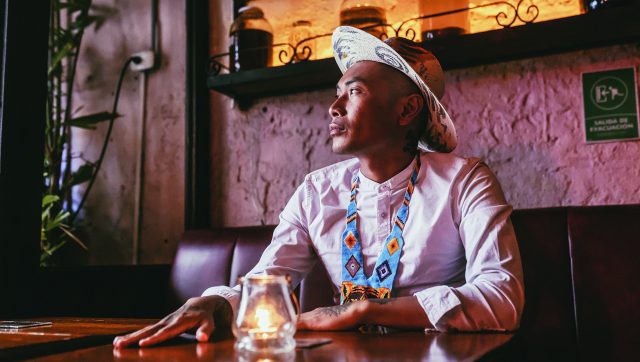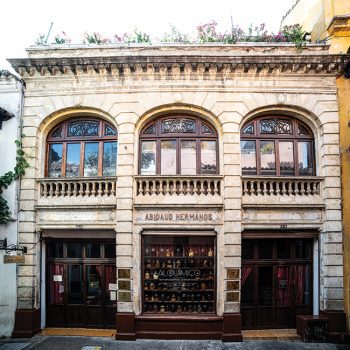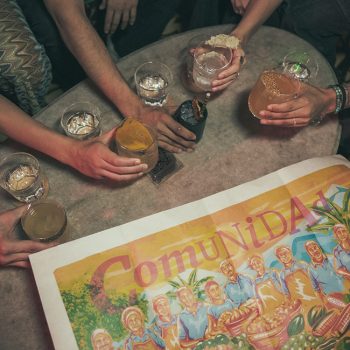Cocktail chat: Jean Trinh, Alquímico
Alquímico, in Cartagena, Colombia, has been widely praised for the cocktails it makes thanks to its farm-to-bar approach.

While some people debate whether terroir exists in spirits, Jean Trinh has a loftier proposition – a cocktail bar that is not only shaped by its place, but one that invests in farming communities, and builds its cocktails with locally and ethically sourced ingredients.
“Colombia is the most biodiverse country in the world,” Trinh says, and with Alquímico, he is putting its fruit, vegetables and herbs on display, gaining global recognition in the process. In 2023, the bar earned the number-nine spot on the World’s 50 Best Bars list and, in July 2024, it was named World’s Best Bar at the Tales of the Cocktail Spirited Awards in New Orleans, Louisiana.
But there is more to Alquímico than thoughtful, sustainable drink-making. Trinh has embraced Colombia’s club-going clientele – “A lot of people here thought that we were a club,” he says, when it opened in 2016 – by enlisting four DJs each night. Doors close at 2am from Sunday to Wednesday and at 3am from Thursday to Saturday. Trinh estimates they serve 1,000 people each night.
“Many friends in the industry ask me, ‘Why don’t you open Alquímico in Paris, or in Dubai?’” he says. “The same energy – it’s impossible. This thing, it’s because it’s Colombia.”

Drinking culture
Born to Vietnamese parents in Paris, Trinh moved to Colombia in late 2013. The following year, with fewer than €5,000 (US$5,540), he opened a pop-up cocktail bar. He discovered a drinking culture that placed undue emphasis on ingredients from Europe and the US, which caused prices to climb. “The price of one cocktail was the salary of one person per day,” Trinh says.
Using only ingredients from Colombia, he was able to cut the cost of each drink by three, and over time, began to produce, and earn, in volume.
After a year, he moved his operation to Cartagena’s Old Town neighbourhood. He scouted locations for six months, and landed on a renovated colonial mansion for what would be Alquímico. A massive space, Trinh opened the ground floor first, with his concept of featuring locally grown ingredients in affordably priced cocktails. Another year passed, and he opened the second floor, which has a kitchen serving vegan and vegetarian food, and a small bar that focuses on classic cocktails. After two more years, he opened the rooftop, which offers refreshing long drinks.
In the span of eight years, Alquímico has gone from five employees to 90, and currently has an average cocktail price of under US$10. Between its price point and sprawling atmosphere, it is pretty far removed from your typical award-winning cocktail bar. “It’s exactly the opposite,” Trinh says. “In Colombia, people dance, people laugh, people enjoy themselves, and the space is big.”
Since arriving, Trinh has seen a slow acceptance of local ingredients by drinkers in his adopted city and country. “I think they took it better because I’m not Colombian,” he says. While Alquímico’s customer split used to be 50/50 foreigners to locals, Trinh says the bar now has more Colombians interested in its work, and other establishments are adopting similar principles.
“Now we have many bars, good cocktail bars in Colombia, not only Cartagena but in Bogota, Medellin, many cities,” he says, “and all of them work with Colombian products.”

From seed to shaker
Before the pandemic, Trinh bought an 11-hectare farm in Filandia, part of Colombia’s coffee region, which now grows more than 150 kinds of fruits and vegetables. “So you can imagine,” he says of the opportunity to oversee his own ingredients from seed to shaker, “it’s boundless.”
As well as his own farm, Trinh works with Asocoman, a community agricultural association, and encourages people to visit Colombia not only to drink at Alquímico, but to visit these farms and the people who tend them. “When you know the people you’re working with, and their family, and their kids can go to school thanks to this relationship or this collaboration it means a lot,” he says. “And when we take our guests to see that, there is an impact.”
He remembers one visit from Ryan Chetiyawardana, creator of Lyaness and other bars, who was impressed by the fact that Asocoman produced 50 kinds of mangoes. “He told me, ‘The sexiest fruit we have in the UK is a green apple,’” Trinh laughs. “We have this kind of comparison with almost every fruit. I can find new fruits every day.”
Trinh believes that when Alquímico wins awards, it is in recognition of its farm work as much as its drinks. Over the years, he has gradually increased his business with Asocoman from 10kg per month to 500kg. “When people vote for us, it’s for the whole thing,” he says. “It’s not only for the bar, it’s for what we do behind it as well.”
The road to success
Winning World’s Best Bar at Tales was especially sweet for Trinh as he has been attending the drinks conference for years. The achievement causes him to think about the road that led to that night.
“Eight years ago was my first time at Tales, and I went there to go to classes,” he says. “We were no one. We were going to the parties, we didn’t expect anything because it was too big for us. And year after year, you start being top 10 in your region, top 10 international, then top four.”
Because of visa complications, Trinh was the only member of the bar staff able to attend Tales this year, and recalls everybody in the room standing up to applaud him. “I know almost everybody in the room,” he says, “and I’ve respected them for years.”
He recalls a portion of his speech in which he implored his peers to visit the bar and farm. “I said something I really believe in, which is, ‘Please come to Colombia, come to Cartagena, because we can’t come, they can’t go to the US. Give us a chance to show you that maybe we deserve this award.’”
Related news
Petition aims to save 9,000 British on-trade venues
